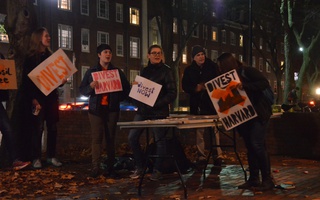UPDATED: November 25, 2015, at 10:55 p.m.
Experts from various disciplines convened Monday to debate the issues and question the politics surrounding the upcoming United Nations Climate Change Conference in Paris this December.
The panel discussion, which took place at the Kennedy School of Government, centered around both the short-term and long-term implications of the conference for national and international climate change policies.
“We wanted to offer an intensive look at all sides of the debates in Paris to allow our community, our students to take an active part in these critical conversations for our future,” said event organizer Cathryn A. Clüver.
Nations participating in the talks have already set measurable goals in preparation for the conference. The panelists emphasized the change in policy which Director of the Harvard University Center for the Environment Daniel P. Schrag characterized as a shift from “top-down negotiation” to a “bottom-up approach,” meaning a focus on country-by-country commitments as opposed to international standards.
The panelists agreed that this approach will yield far better long-term results because countries will have an incentive to meet their own goals.
The panelists had varying opinions on the implications of climate change for developed and developing nations.
René Castro Salazar, the former Minister of Environment and Energy in Costa Rica, spoke about the eventual consequences of global warming and rising sea levels on Latin American nations. “They will suffer the most. The small island states will disappear,” he said.
Panelist Robert N. Stavins, who is a Kennedy School professor, said one of his hopes for the conference would be “putting aside the unproductive disagreements between what we initially characterize as the developed and the developing world.”
The experts were all in agreement that the Paris conference is only one step in a much longer process aimed at addressing climate change, and all the panelists expressed optimism regarding the possibilities presented by the Paris conference and changing global policies.
“It’s not only what happens in Paris, but it’s also what happens beyond Paris and the actual, concrete steps taken on the ground,” said Paula J. Dobriansky, former under secretary of state for democracy and global affairs.
Moderated by Kennedy School professor R. Nicholas Burns, the panel was hosted by the Belfer Center for Science and International Affairs’ Future of Diplomacy Projectas a kick-off for its “Climate Change Diplomacy Week.”
Read more in University News
Blaming Citizens United Is an ‘Oversimplification,’ Tribe SaysRecommended Articles
-
Fencing Team Defeats ColumbiaThe University fencing team easily defeated the Columbia team Friday evening in the Hemenway Gymnasium. The University men scored six
-
Fact and Rumor.Yale plays Amhert at Amherst tomorrow. There will be no lectute in Fine Arts 3 on Saturday. The second thesis
-
Conference Francaise.A meeting of the Conference Francaise was held last evening, at which Professor Colm related some of his experiences during
-
Work of Parisian Printers in GoreIn connection with the course in the History of Printing, given in the Graduate School of Business Administration, there will
-
 Climate Change Panelists Address Upcoming U.N. Conference
Climate Change Panelists Address Upcoming U.N. Conference













